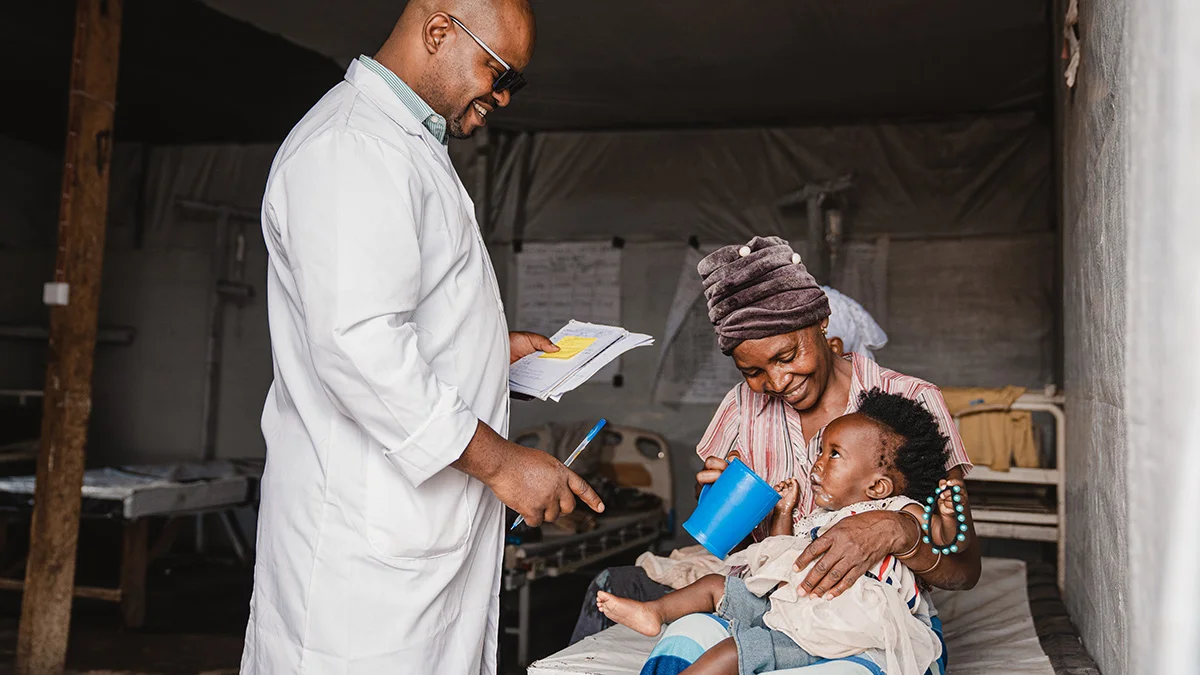As the number of mpox cases continues to rise across the Democratic Republic of the Congo (DRC), UNICEF is stepping up its support to the government to protect and save the lives of children under 15 years of age who account for about 60 per cent of suspected cases and 80 per cent of deaths this year.
From the beginning of the year to 31 August 2024, the DRC has recorded more than 21,000 suspected mpox cases, including over 5,000 confirmed cases and 700 deaths.
“Last week, I travelled to the centre of our response in South Kivu and saw first-hand the difference our teams on the ground are making for children,” said UNICEF DRC Deputy Representative Dr Mariame Sylla. “I met a mother who was able to quickly get the free treatment needed for her 6-month-old daughter Merci after she caught the virus. But as case numbers rise and needs grow, we need to step up our efforts so that all children get the lifesaving care they need.”
Over the past week, UNICEF received the first shipments of the mpox vaccine totalling 215,000 doses. More shipments are expected to arrive soon. Meanwhile, UNICEF is supporting the vaccine roll-out through related supplies and logistics, and training of health workers in transportation, storage, and administration of vaccines to patients.
Working with the DRC government, WHO, and Africa CDC, UNICEF is leading on infection prevention and control, risk communication and community engagement, nutrition, mental health and psychological support, and operational research.
In recent months, UNICEF has enhanced community-based surveillance, training over 200 health workers, 100 hygienists, and 200 community engagement teams. Additionally, 6,000 community workers have been deployed to raise awareness, with more than 30 local radio stations broadcasting public health messages.
UNICEF has also set up mpox treatment and isolation units in busy health centres, including Kavumu and Lwiro in the Miti Murhesa health zone, offering free treatment with a capacity of 20 to 30 beds. More than 30 medical kits have been distributed in the health zones of Kavumu, Lwiro, Kamanyola, and Uvira, as well as at Miti Murhesa General Hospital and Bukavu Central Prison. Between May and August 2024, these interventions helped care for over 1,500 patients, over 70 per cent of whom are children under 15.
Community engagement teams have so far reached 46 million people across DRC with mpox messages via mass media, face-to-face engagement, and SMS and digital channels. Upcoming efforts will focus on vaccine efficacity and safety while countering misinformation. UNICEF supports risk communication and community engagement across all 26 provinces.
UNICEF’s mpox response targets 12 out of DRC’s 26 provinces, with five provinces considered as very high priority*. The agency requires a total of $35 million to reach a total of 2.28 million people, including 1.32 million children, over the next 6 months. The funding gap currently stands at 79 per cent.
Across DRC, more than 25 million people need humanitarian assistance, including almost 15 million children. In the east of the country alone, 7 million people are displaced, making DRC one of the biggest displacement crises globally.
“Many of the people affected by the mpox emergency were already facing multiple deprivations due to armed conflict, displacement and other disease outbreaks,” said Dr Sylla. “The mpox response must not overlook pre-existing humanitarian needs, and any measures should serve to reinforce existing efforts.”
In Zusammenarbeit mit der Regierung der DRK, der WHO und dem Africa CDC führt UNICEF umfassende Massnahmen zur Infektionsprävention und -bekämpfung durch. Dies umfasst Risikokommunikation, Engagement der Gemeinschaften, Ernährung, psychologische Unterstützung und operative Forschung.
In den letzten Monaten konnte UNICEF die gemeindenahe Überwachung verbessern und über 200 Gesundheitshelfer, 100 Hygieniker und 200 Teams für das Engagement in den Gemeinden geschult. Darüber hinaus wurden 6000 Gemeindemitarbeitende zur Sensibilisierung eingesetzt, und mehr als 30 lokale Radiosender verbreiteten Gesundheitsbotschaften und Präventionsmassnahmen.
UNICEF hat in stark frequentierten Gesundheitszentren wie Kavumu und Lwiro Mpox-Behandlungs- und Isoliereinheiten eingerichtet. Diese bieten kostenlose Behandlungen für 20 bis 30 Patienten an. Mehr als 30 medizinische Kits wurden in den Gesundheitszonen von Kavumu, Lwiro, Kamanyola und Uvira sowie im Allgemeinen Krankenhaus von Miti Murhesa und im Zentralgefängnis von Bukavu verteilt. Zwischen Mai und August 2024 wurden über 1500 Patienten versorgt – darunter mehr als 70 % Kinder unter 15 Jahren.
Die Teams, die sich in den Gemeinden engagieren haben bisher 46 Millionen Menschen in der DRK über Massenmedien, persönliche Gespräche, SMS und digitale Kanäle über Mpox informiert. Die zukünftige Verbreitung von Informationen konzentriert sich auf die Wirksamkeit und Sicherheit des Impfstoffs und soll gleichzeitig Fehlinformationen entgegenwirken. UNICEF wird die Risikokommunikation und das Engagement der Gemeinden in allen 26 Provinzen der DRK weiter unterstützen.
UNICEF fokussiert seine Mpox-Massnahmen auf 12 der 26 Provinzen der DRK, wobei fünf Provinzen als besonders vorrangig gelten. Um in den kommenden sechs Monaten insgesamt 2,28 Millionen Menschen – darunter 1,32 Millionen Kinder – zu erreichen, benötigt die Organisation 35 Millionen US-Dollar. Derzeit liegt die Finanzierungslücke bei 79 Prozent.
Mehr als 25 Millionen Menschen in der DRK benötigen humanitäre Hilfe, darunter fast 15 Millionen Kinder. Allein im Osten des Landes sind sieben Millionen Menschen auf der Flucht, was die DRK zu einer der grössten Vertreibungskrisen weltweit macht.
«Viele der von der Mpox-Krise betroffenen Menschen haben bereits durch bewaffnete Konflikte, Vertreibung und andere Krankheitsausbrüche erhebliche Entbehrungen erlitten», erklärte Dr. Sylla. «Die Mpox-Reaktion darf die bereits bestehenden humanitären Bedürfnisse nicht übersehen, und alle Maßnahmen sollten darauf abzielen, die bestehenden Anstrengungen zu verstärken.»






